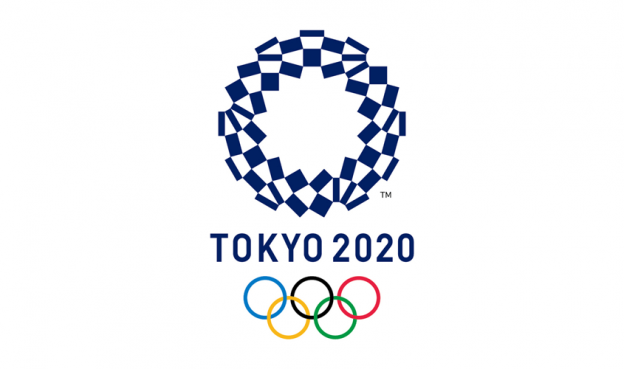As the 2020 Olympic and Paralympic games draw nearer, it becomes clear that the 32nd Summer Olympiad, for all of its benefits, brings with it a myriad of challenges. Among these include the scrapping of a 2-billion-dollar center-piece stadium, an original logo mired with plagiarism allegations, cost overruns, ineffective leadership, finger pointing, and doubts that the Japanese government will be prepared for the games, on time.
This, however, is not unlike recent Olympic Games. Every Olympic Games since 1960 (for which there is data) exceeded its budget by around 179%. The 2014 winter Games, held in Sochi, Russia, came with a whopping 66.7-billion-dollar price tag (More than 5 times over budget and surpassing Beijing 2008 as the most expensive Games of all time).
Tokyo has waded through similar problems before, however, during the preparation of the 1964 Olympics, which could be regarded as one of the most successful Games of all time. The ’64 Olympics kick started a massive urban transformation within the city of Tokyo, lifting it, and Japan as a whole, from the ashes of WWII, and bringing the nation back onto the world stage. Although these Games were successful, they left a troubled legacy many have forgotten, and one that could be unfortunately repeated.
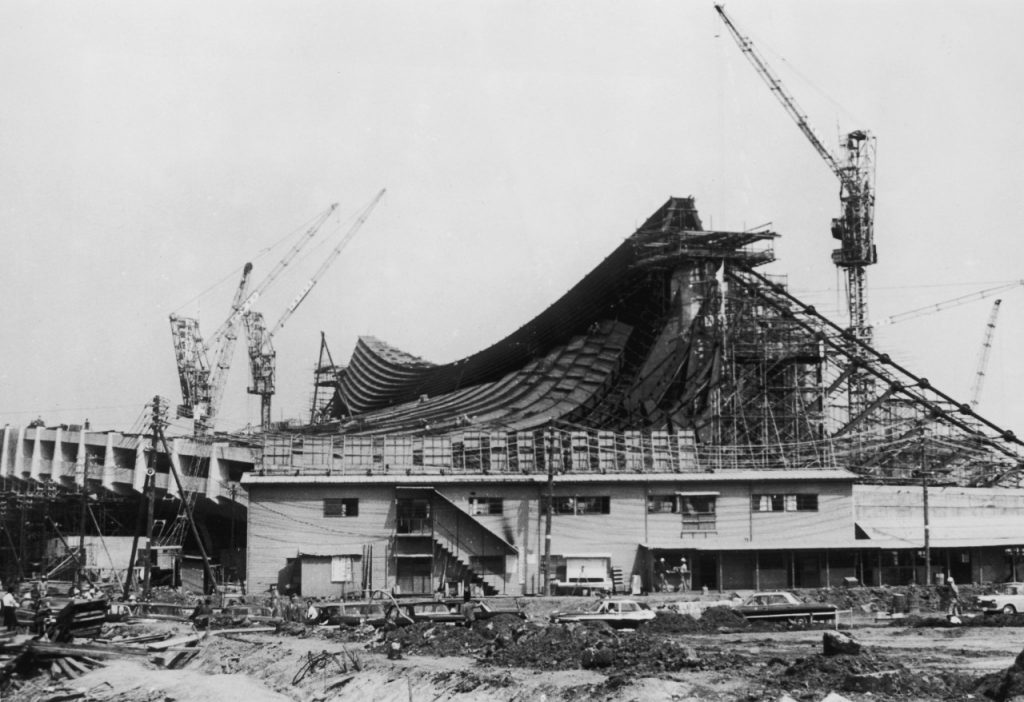
fig. 1. The National Gymnasium complex under construction in Tokyo on June 6, 1964, just a few months before the games were to begin. (Keystone/Hulton Archive/Getty Images)
Tokyo’s 2020 bid relied heavily on the promise of transformation coupled with increased public support. The city’s 2016 bid failed primarily because of the lack of public support. A 2009 poll showed that only 56% of Japanese citizens supported hosting the games (The lowest among the 4 candidate cities). Following the 2011 Triple Disaster, this changed, and the nation rallied together longing for a symbol to lift their hopes. In March 2013, roughly 70% of the Japanese public supported the idea of hosting the 2020 Games.
Similar to the 1964 Games, in terms of Japan looking to lift itself from disaster through the Olympics, yet different to the extent that this time around, the IOC saw Tokyo as a safe bet (In comparison with Istanbul & Madrid), Tokyo was awarded the Games on September 7th, 2013. In mid-January, 2015, allegations surfaced that bribery, on behalf of the Japanese Government, played a heavy role in this decision. This would be the first of many controversies surrounding the 32nd Olympiad.
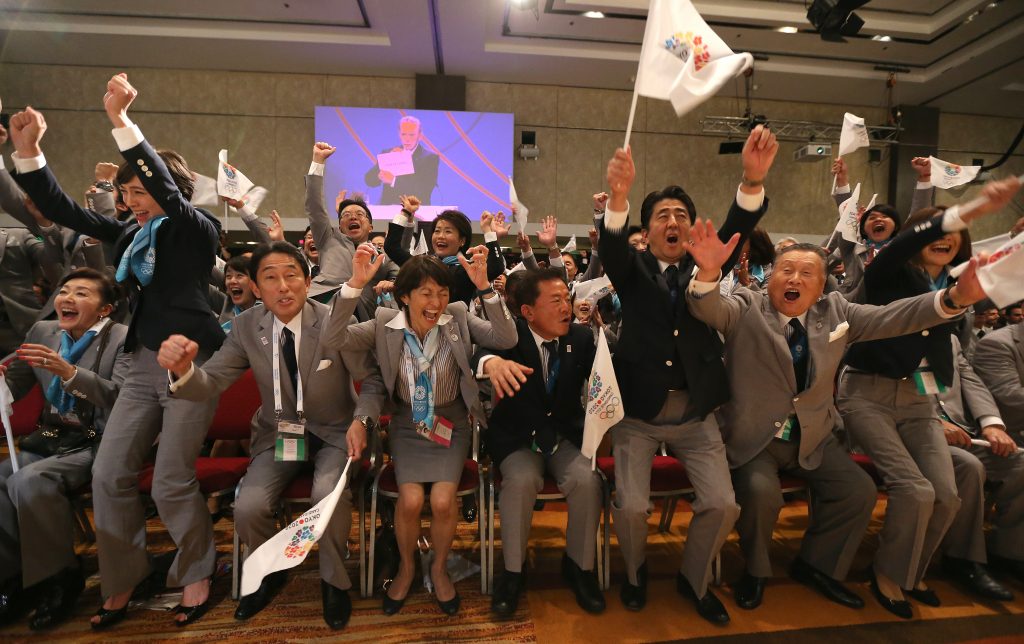
fig. 2. Japanese Prime Minister Shinzo Abe (3-R) celebrates alongside Tokyo 2020 delegation members after IOC president Jacques Rogge announced the Japanese capital to be the winner of the bid to host the 2020 Summer Olympic Games, during the 125th session of the International Olympic Committee (IOC), in Buenos Aires, on September 7, 2013. The three cities bidding to host the 2020 Summer Olympics — Madrid, Istanbul and Tokyo — delivered their final presentations ahead of the expected tight vote by the IOC, though Madrid was eliminated from the race moments after, in the first round of voting. AFP PHOTO / YAN WALTON (YAN WALTON/AFP/Getty Images)
The initial budget proposed sat at only 7-billion dollars, to be used mostly on infrastructure updates. The 1964 Games were characterized by the Japanese Government’s intention to not only rebuild Tokyo, and the nation alike, but to double GDP while modernizing the economy. The 2020 Games, however, are starkly different in this remark, not even adding to Prime-Minister Shinzo Abe’s “Abenomics” plan.
In September 2015, the official logo was scrapped as plagiarism allegations surfaced. Shortly thereafter, the new national stadium’s original design was likewise replaced, due to cost overruns ($1.3 billion to $2.1 billion). The price of the stadium led to such fierce public backlash, that Shinzo Abe’s handpicked sports minister (and political ally), Hakubun Shimomura, officially resigned from his position. In December 2015, a more modest stadium-design was picked, with an expensive price tag of 1.26-billion dollars and fears that it may not be built on time.
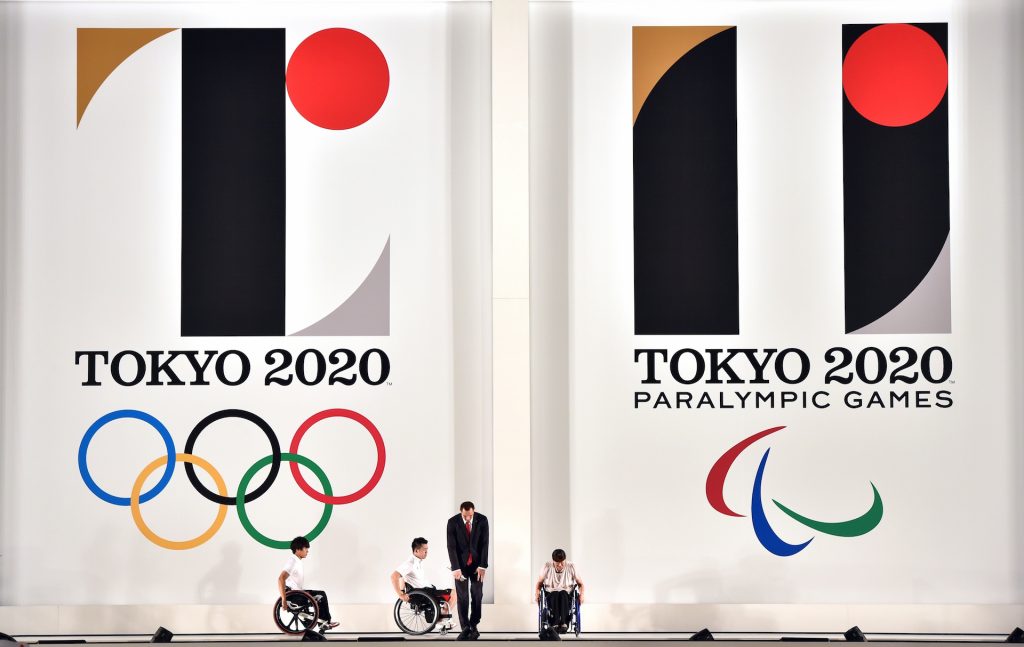
fig. 3. This picture taken on July 24, 2015 shows hammer throw gold medalist Koji Murofushi (2nd R) and young athletes attending a ceremony to unveil the new logos of the Tokyo 2020 Olympic (L) and Paralympic Games at the Tokyo city hall. AFP PHOTO / Yoshikazu TSUNO (YOSHIKAZU TSUNO/AFP/Getty Images)
If recent history is an indicator, no nation should expect to come under budget when hosting the Olympics. This is especially worrying for a nation such as Japan, bogged down by a sizeable national debt, and in the midst of a prolonged recession. The 2012 Games in London spent 5 times their initial projection. The 2004 Games in Athens spent 16 times theirs (This contributing to Greece’s financial meltdown and collapse some years later). So far, the estimated cost is expected to exceed 15-billion dollars, higher than the original budget. Furthermore, this figure could rise if the pattern of the last few Games is followed. The increased cost of the Games has had a direct impact on the public, as well. The shohizei (consumption tax) has risen from 5% to 8%, and is expected to climb further to 10% this year. Japan’s national debt already sits at $11-trillion, roughly 245% of GDP. The 2020 Games could be a difficult cost to shoulder if they continue to run over-budget.
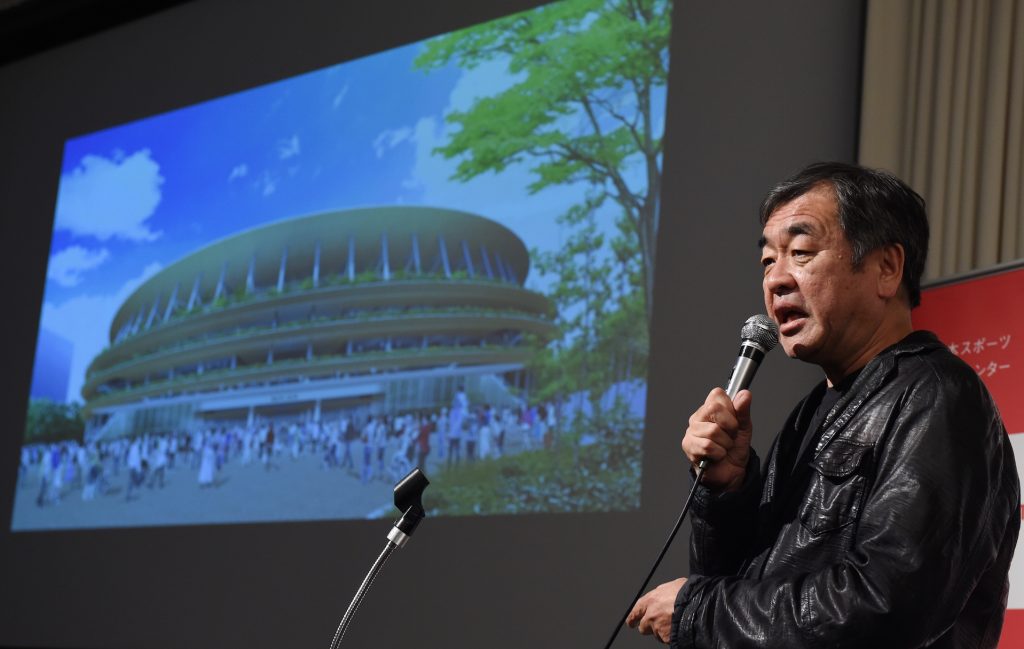
fig. 4. Architect Kengo Kuma explains his design of the stadium during a press conference announcing new design of the national stadium in Tokyo on December 22, 2015. Japan Sports Council chose a new, slimmed down 2020 Olympic Stadium design, after an earlier version set off a row over a 2.0 billion USD price tag that would have made it the world’s most expensive sports venue. / AFP / TOSHIFUMI KITAMURA (TOSHIFUMI KITAMURA/AFP/Getty Images)
In many ways, Tokyo is a fantastic host-city for the Olympics. It truly is a city of the future, and a showcase of one of the greatest modernization stories in history. The city has adequate roads, efficient public transportation, and a friendly populace. Yet despite this, fears still loom on what kind of an impact these games will have on Japan’s future. Unlike 1964, Japan is not in a position wherein showcasing itself is the only way to achieve revitalization. In this day and age, such a showcase may spread the nation’s resources too thin. In any case, we will have to wait until the Summer of 2020 to hope for a successful Olympiad, and wait longer to understand its long-term effects.
Sources
Associated Press. “Tokyo 2020 Bid Gains Support”. ESPN. March 5, 2013.
Crouch, Ian. “Tokyo 2020: A Perfect Olympic Vision?” The New Yorker. September 10, 2013.
Himmer, Alastair. “Tokyo Bid Suffers In IOC Support Poll Of Residents”. Reuters. May 2, 2009.
Roberts, David and Robert Whiting. “Are the Tokyo 2020 Olympics In Trouble?” Foreign Policy. February 19, 2016.
Spitzer, Kirk. “Troubled Tokyo Olympics Is Creating An Olympian Headache For PM Abe”. USA Today. December 25, 2015.
Wilson, Stephen. “IOC Asks For Transcripts Suggesting 2020 Olympic Bid Bribery”. Associated Press. January 15, 2016.
Yan, Sophia. “IMF Warns Japan Over Its Staggering National Debt”. CNN Money. July 24, 2015.
